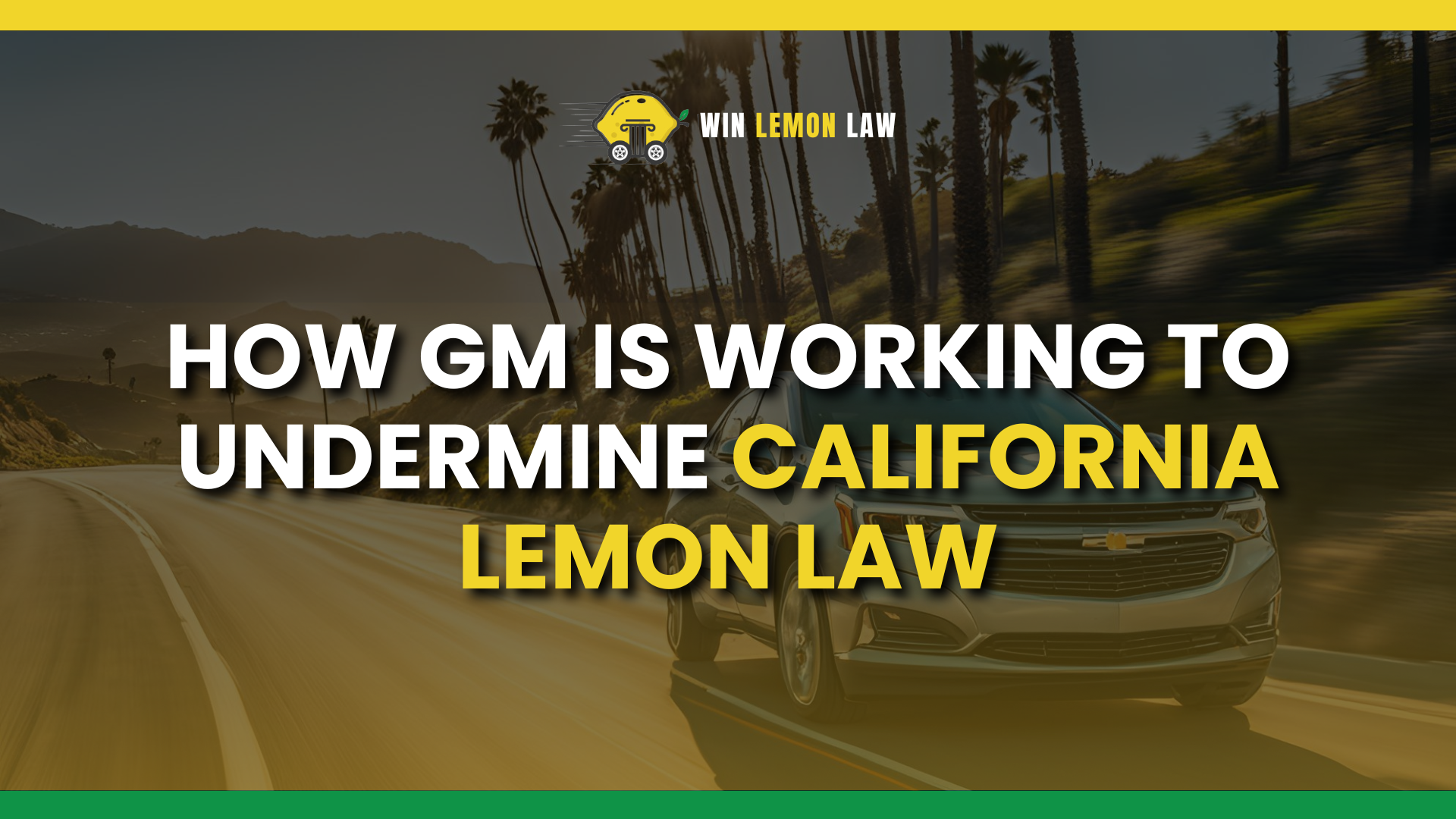California’s lemon law, officially known as the Song-Beverly Consumer Warranty Act, has stood as one of the nation’s strongest safeguards for vehicle owners. It ensures that individuals burdened with defective vehicles are provided relief, holding manufacturers accountable for their failures. However, this vital consumer protection is now under attack, with major automakers like General Motors (GM) pushing for legislative changes that could significantly weaken these rights.
At Win Lemon Law, we are committed to defending California consumers and helping them navigate these challenges. In this post, we’ll break down the recent developments in lemon law, explain your rights under this critical law, and offer actionable steps to protect yourself if you’re dealing with a defective vehicle.
What is California Lemon Law?
The Song-Beverly Consumer Warranty Act, commonly referred to as the California Lemon Law, was enacted to protect consumers who purchase or lease vehicles with serious defects. If your vehicle is found to be a “lemon,” this law ensures that you are entitled to compensation or replacement.
Key Protections Under California Lemon Law
The lemon law applies to vehicles covered by the original manufacturer’s warranty and mandates that manufacturers repair or replace defective vehicles that cannot be fixed after a reasonable number of attempts. Here’s what the law guarantees:
- Full Refund or Replacement
- If your vehicle is deemed a lemon, the manufacturer must either replace it or provide a refund. This refund includes the purchase price, sales tax, registration fees, and other incidental costs.
- Reimbursement for Attorney Fees
- California lemon law requires manufacturers to cover your legal fees if you prevail, meaning you don’t pay out of pocket for legal representation.
- Coverage Beyond Passenger Cars
- This law extends to many vehicle types, including trucks, motorcycles, and leased vehicles, provided they meet specific criteria.
- Reasonable Repair Attempts
- A vehicle qualifies as a lemon if:
- The defect substantially impairs the vehicle’s use, safety, or value.
- The manufacturer fails to repair the defect after a reasonable number of attempts.
- The vehicle has been out of service for repairs for 30 or more cumulative days.
- A vehicle qualifies as a lemon if:
Why Lemon Law Matters
Defective vehicles can put drivers and passengers at risk, lead to significant financial losses, and create unnecessary stress. California lemon law levels the playing field, ensuring that consumers aren’t left paying for manufacturers’ mistakes.
At Win Lemon Law, we understand the intricacies of this law and are here to help you navigate the claims process.
The Push for Legislative Change
California’s lemon law is under threat due to efforts like Assembly Bill 1755. This legislation, introduced and supported by General Motors, seeks to introduce changes that, on the surface, appear beneficial to consumers but ultimately favor manufacturers.
Shortened Timelines
One of the key changes in AB 1755 involves shortening the statute of limitations to file a lemon law claim. This reduction could leave unsuspecting consumers unable to take action in time, particularly those unfamiliar with the law or facing language and financial barriers.
Increased Consumer Burden
AB 1755 also requires consumers to provide written notice to manufacturers about specific defects before pursuing a claim. For many first-time lemon law claimants, this added step creates confusion and increases the risk of errors that could invalidate their claims.
Impact on Refund Calculations
The bill introduces provisions allowing manufacturers to deduct negative equity from refunds, which could trap consumers with significant financial losses despite owning a defective vehicle.

Why is GM Leading This Charge?
In recent years, GM has faced a growing number of lemon law claims due to widespread defects and recalls. These claims not only result in financial losses but also damage the company’s reputation.
By advocating for legislative changes that reduce the number of valid claims, GM aims to protect its bottom line. Unfortunately, these changes often come at the expense of consumer safety and fairness.
How to Protect Yourself Under California Lemon Law
If you suspect your vehicle may qualify as a lemon, taking swift and well-documented actions is crucial. California’s lemon law is a powerful tool for consumers, but protecting your rights requires awareness, preparation, and the right legal support. Here’s how you can safeguard yourself and maximize your chances of a successful claim:

1. Keep Detailed Records
Good documentation is the foundation of any successful lemon law claim. Maintain a thorough record of every interaction related to your vehicle, including:
- Purchase and Lease Agreements
- Keep copies of your original purchase or lease agreement and the manufacturer’s warranty. These documents prove your vehicle is covered under the warranty.
- Repair Orders and Receipts
- Every time your vehicle goes in for repairs, ensure you receive a detailed repair order. The document should include the date, description of the issue, and any work performed.
- Communication Logs
- Record all communications with the manufacturer or dealership. Note dates, times, names of representatives, and the content of your conversations. Emails or written correspondence are even better.
2. Report Issues Immediately
As soon as you notice a defect, notify the manufacturer or dealership promptly. This step is essential because:
- Timeliness Matters
- California lemon law requires that the defect be reported while the vehicle is under the original warranty. Acting quickly ensures you meet this requirement.
- Create a Paper Trail
- Reporting the issue establishes a timeline, showing that you brought the problem to the manufacturer’s attention in a timely manner.
Be specific when describing the problem. Use clear, detailed language to explain the issue and its impact on the vehicle’s safety, value, or usability.
3. Follow the Manufacturer’s Instructions
Manufacturers often require specific steps to address vehicle defects. These steps typically include:
- Visiting Authorized Repair Facilities
- Take your vehicle to the dealership or a repair shop authorized by the manufacturer. Unauthorized repairs could void your warranty or complicate your claim.
- Allowing Reasonable Repair Attempts
- California law mandates that manufacturers be given a reasonable number of attempts to repair the defect. Typically, this is two or more attempts for the same issue.
Keep all repair receipts and notes from these visits. If the repairs fail to resolve the problem, this documentation will strengthen your claim.
4. Be Aware of Deadlines
One of the most critical aspects of protecting your lemon law rights is adhering to the legal deadlines:
- Statute of Limitations
- You typically have up to four years from the time you first noticed the defect to file a claim. However, proposed changes like those in Assembly Bill 1755 could shorten this window. Acting sooner rather than later is always a good idea.
- Response Deadlines
- If the manufacturer requests additional information, respond promptly. Delays could jeopardize your claim.
5. Avoid Making Common Mistakes
Certain missteps can weaken your claim or even disqualify you under California lemon law. To protect yourself:
- Don’t Ignore Small Issues
- What seems like a minor problem now could escalate. Always report defects, even if they don’t seem significant.
- Don’t Stop Repair Attempts Prematurely
- Allow the manufacturer adequate opportunities to fix the defect. If they fail, your claim becomes stronger.
- Don’t Rely Solely on the Dealership
- While dealerships handle repairs, they don’t always act in your best interest. Consult a lemon law attorney for impartial guidance.
6. Consult a Lemon Law Attorney
Lemon law cases can be complex, especially when dealing with large manufacturers and their legal teams. An experienced attorney can:
- Evaluate Your Case
- An attorney will determine if your vehicle meets the criteria for a lemon law claim.
- Negotiate on Your Behalf
- Manufacturers often resist refunding or replacing defective vehicles. A lawyer can ensure you get the compensation you deserve.
- Handle Legal Procedures
- From filing the claim to navigating court proceedings, an attorney will manage the process, so you don’t have to worry about the details.
The best part? California lemon law often requires manufacturers to pay for your legal fees if your claim is successful, making legal representation an affordable option.
7. Know Your Rights
Understanding California lemon law is one of the most effective ways to protect yourself. This includes:
- Knowing what qualifies a vehicle as a lemon (e.g., substantial defect, unsuccessful repair attempts, etc.).
- Being aware that manufacturers must reimburse all related costs, including sales tax, registration fees, and attorney fees.
- Recognizing that lemon law protections apply to purchased and leased vehicles, as well as trucks and motorcycles under warranty.
8. Act Quickly and Stay Proactive
Time is of the essence in any lemon law case. If you suspect your vehicle may be a lemon, don’t delay:
- Start documenting and reporting issues immediately.
- Reach out to an attorney as soon as repair attempts fail.
- Stay informed about legislative changes that may impact your rights.
By staying proactive, you’ll position yourself for the best possible outcome.

What to Do If Repairs Fail
To qualify under California lemon law, a vehicle must meet specific criteria:
- The defect was reported while the vehicle was under warranty.
- The defect significantly affects safety, usability, or value.
- The manufacturer has been given a reasonable number of attempts to repair the defect.
If your vehicle meets these criteria, contact a lemon law attorney immediately to begin the claims process.
Protecting Your Rights Amid Legislative Changes
As changes like AB 1755 take effect, it’s more important than ever to stay informed about your rights. While manufacturers may push for laws that limit consumer protections, California lemon law remains a powerful tool for vehicle owners who take timely action.
At Win Lemon Law, we are committed to fighting for California consumers. If you believe your vehicle is a lemon or want to learn more about your rights, contact us today for a FREE consultation.
Contact Us
For more information about California lemon law or to schedule your consultation, reach out to Win Lemon Law today. We’ll help you navigate the process, protect your rights, and ensure you receive the compensation you deserve. Don’t wait—get in touch with us today.

